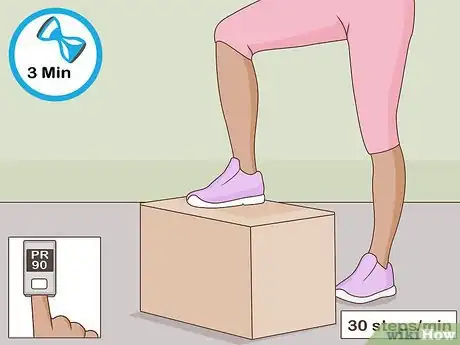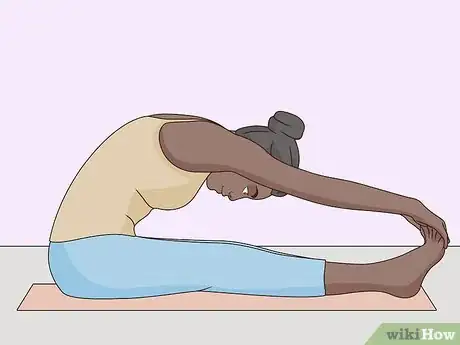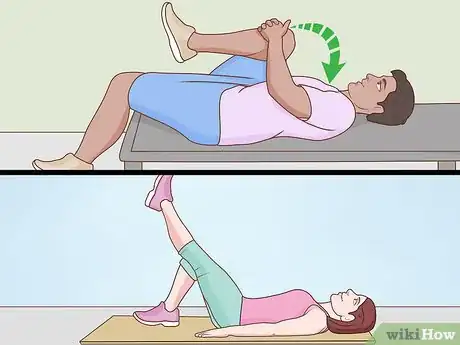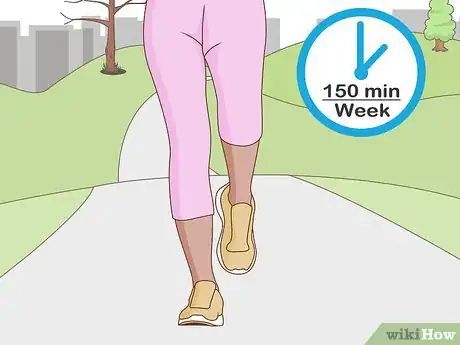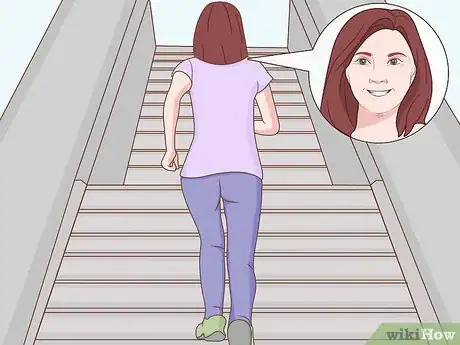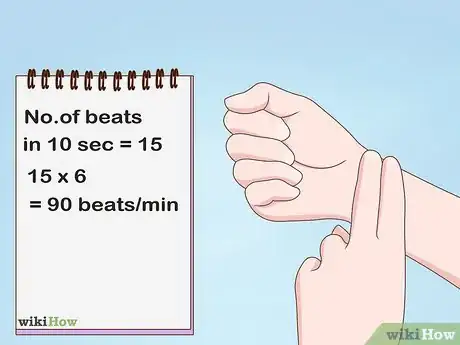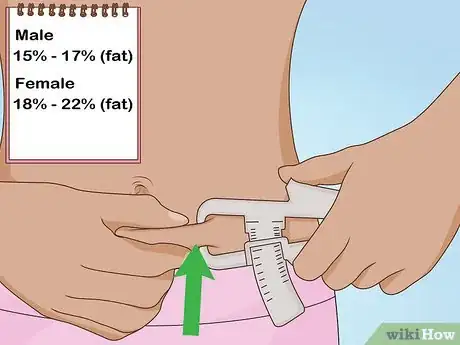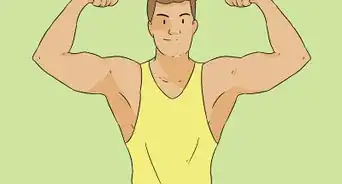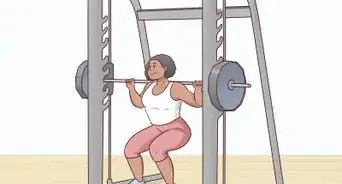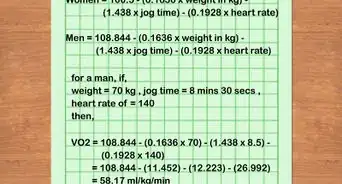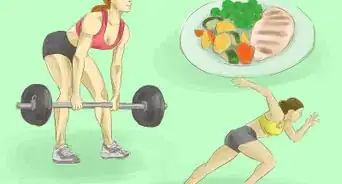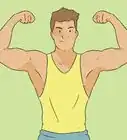This article was co-authored by Yvonne Mo. Yvonne Mo is a Fitness and Health Coach and Kung Fu Instructor. With more than 21 years of fitness industry and martial arts experience, she specializes in combining and teaching eastern and western fitness and health modalities, which include Tai Chi, sports acupuncture, Chinese medicine, and fire cupping. Yvonne received her Personal Trainer Certifications through both the National Strength and Conditioning Association and the American College of Sports Medicine.
There are 10 references cited in this article, which can be found at the bottom of the page.
This article has been viewed 109,403 times.
Whether you're thinking of taking up an exercise program for the first time or are already a regular gym user, do you ever wonder how fit you really are? Personal trainers agree you should test your fitness levels every three months to gauge your progress and to keep your body challenged. Most tests only take several minutes to complete and no special equipment is needed. They can be incorporated into your fitness regime every three months.[1]
Steps
Signs You're Physically Fit
-
1Measure your cardiovascular fitness. Cardiovascular fitness is how efficiently your heart and lungs transport oxygen.[2] You can use a step exercise to test your aerobic fitness. Before performing any fitness exercises and tests, always consult your doctor. If you feel any exhaustion, stop the exercise immediately and rest.
- Use a step approximately 18 inches (460 mm) high and grab a stopwatch
- Climb up and down the step for three minutes at a rate of 24 steps per minute. That’s roughly a step every 2 seconds (don’t forget to breathe). After three minutes, stop. Then rest for one minute. After resting, take your pulse for 30 seconds.
- Once you know your pulse, look at the table below and find your pulse to rate your current fitness level. Note that these results are accurate for 18-25 year olds. To check your results with a different age range, look at the full results list.
-
Men
- Excellent: 84 or lower
- Average: 85-100
- Poor: 101 or higher
-
Women
- Excellent: 93 or lower
- Average: 94-110
- Poor: 111 or higher
-
Men
-
2Try to touch your toes.[3] This test not only checks your overall flexibility but can also increase coordination. To perform the test, try touching your toes or stretching your arms across your body. If your muscles tighten or pull, it may be time to start stretching again. If you’re looking to increase your flexibility at home, add stretching into your gym routine. Try holding a hamstring stretch for 30 seconds three times a week, and you should start to see results within the month.Advertisement
-
3Test your flexibility.[4] Check your hips and hamstrings. They're a good gauge of overall flexibility since they link the upper and lower body. The tests here are preferable to the classic sit-and-reach, which can aggravate back pain:[5]
- Lie faceup on an exercise table or bench, your lower legs hanging off the end. Put the bottom of your buttocks on the edge of the table. Try to hug one of your knees into your chest. If your opposite leg (the one that is hanging) rises above the height of the table, then you have tight psoas (not hamstrings). Side note: you may also have tight gluteal and QL (quadratus lumborum) muscles. The psoas is a muscle within the front of your hips that wraps around the bottom of your spine. If it's too tight, then it can cause poor posture and lower back pain. To improve this by opening the front of your hips to extend them, you should kneel on the side that you want to stretch while the other leg is positioned with the bottom of your foot flat on the floor in front of you like when a person proposes to another to be married. Ensure that the knee of the leg on the side that your are stretching is right below your hip if you are a beginner of this stretch. Raise the arm of that same side that you are stretching straight up. Then, flex your buttocks. You should feel the stretch in the front of your hips. If you don't feel much of a stretch in the front of your hips, then move the knee of the side that you are stretching backward an inch or two and push your hips forward while flexing your buttocks. Hold the flexion of your buttocks for 15-30 seconds and do this for a total of 3 sets per side (left and right). Thank me later.
Here's a hamstring flexibility test: Lie flat on the table with both legs extended. Lift your right leg toward the ceiling without bending your knee. Do both tests on each side.[6]
-
1
- On the hamstring test, if you can lift your leg to 80 degrees, you'll also know that your hip flexibility is good. Less than that means you have tight hamstrings, which can tug on your lower back, affecting your posture and causing pain.[7]
- Get more flexible. Lie faceup in a doorway with your left knee bent and right hip near the right side of the door frame. Extend your right leg to the ceiling with the back of the leg against the edge of the door frame. Flex your foot, pressing your heel toward the ceiling. Hold for 20 to 30 seconds. Repeat on your left leg. Do up to three times a day.[8]
-
2See if you can hold a plank for a minute. This is a sign of strong abs and a lower back. The plank is touted as one of the best full-body exercises you can ever do. If you can hold a plank for about a minute or longer, you are in pretty good shape. Want to know if you’re in really good shape? Go for two, or try plank variations for even more of a challenge.
-
3See if you can run for two miles. The U.S. military uses a two-mile run test to evaluate a potential serviceperson's fitness level. The test allows you to push yourself and challenge your endurance.[9]
- Chart a two-mile course with a GPS. Jog for 10 minutes to warm up, and begin running. Time your running with a stopwatch, and run quickly while knowing your limits. [10]
- While a finish time of 17:30 is enough for servicewomen ages 37 to 51 to pass the test, breaking 18 minutes is considered above average for those in that age range.[11]
- To develop your speed, include intervals—short bursts of maximum effort—to your cardio sessions. Interval training pushes your heart and lungs past what they're used to. This delivers speedier results than if you were to exercise at a regular pace. Intervals used to be considered as an exercise for people who are very fit because the exercise so difficult, but it can benefit everybody.[12]
Examining Your Habits and Daily Practices
-
1Pay attention to the amount of weekly exercise you get. If you are fit enough to exercise for at least 120 minutes each week, you are considered fit. Switch up your workouts, challenge yourself, and set a goal of two hours of exercise or more per week. You'll want to get at least 150 minutes of moderate activity per week. This can include walking briskly or even mowing the lawn. For vigorous activities like running or higher-intensity aerobics, the recommendation is 75 minutes. Try to follow all of these guidelines.
- If you're pursuing peak fitness, try to exercise more vigorously when possible (remember to take lots of breaks). If you don’t exercise this much, not to worry—incorporating beneficial interval training is a perfect place to begin a fitness regimen.
-
2Try to shop without needing to pause and catch your breath. Have you ever purchased just a few things from the grocery store to then walk back to your car carrying your bags without a cart? That’s an effort worth recognizing. Even pushing a heavy cart without getting out of breath indicates you’re in decent shape. Are you able you lift all those grocery bags from the trunk to the kitchen counter without being winded? That's another sign of strength and cardiovascular fitness. It's a small detail, but it's a great sign that you're fit.[13]
-
3Pay attention to how you feel. You will know when you are fit simply by how you feel. You should feel guilt-free and stress-free. Physical activity should also play a big role in your life. In other words, you should be able to walk up a flight of stairs without feeling winded.[14]
-
4Consider your muscular strength.[15] When you think of muscular strength, think of the force that your muscles need to exert during activities. Can you perform everyday tasks with ease and sustain increased periods of exertion? The best way to make your muscles more robust is by pushing them against an opposing object or by doing resistance training. Resistance training can come from gravity or by using weights.
-
5See if you tend to stand instead of sit. It’s common that highly active people are just plain active. They stand more than they sit and are often even more fidgety as well. If you stand just as much as you sit each day or even stand for a few minutes every hour, you're fitter than you think. Pay attention to your tendencies. See how often you stand in order to judge your level of fitness.[18]
-
6Watch how you sleep. Believe it or not, increased sleep is a sign if you are in shape or not. Exercise can strengthen your circadian rhythm and help those who struggle with insomnia. If your quality of sleep is suffering and you’re not regularly active, try incorporating some moderate activity, like a brisk walk, into your daily routine.
Checking Your Stats
-
1Check your resting heart rate. Your heart rate at rest is a measure of heart health and fitness. For most adults, a healthy resting heart rate is 60 to 100 beats a minute. For children, it's about 50 to 70.[19] To check your pulse over your carotid artery, place your index and middle fingers on your neck to the side of your windpipe. To check your pulse at your wrist, place two fingers between the bone and the tendon over your radial artery, located on the palm side of your wrist below the thumb. When you feel your pulse, look at your watch and count the number of beats in 10 seconds. Multiply this number by 6 to get your heart rate per minute. Let's say you count 15 beats in ten seconds. Multiply 15 by 6 for a total of 90 beats a minute.[20]
-
2Check your BMI. To determine if you are physically fit, you'll need to learn about body mass indexing. This is a very common tool used to gauge levels of physical fitness. BMI is used by medical professionals when diagnosing whether a person is at a healthy, overweight, or obese weight level. The basic formula for determining BMI is:[21]
- Your weight in pounds times 704.5 divided by your height in inches times your height in inches. The result should be between zero and more than thirty. If you are physically fit, your BMI should be between 19 and 24.9. If you are between 25 and 29.9, you are considered overweight. A BMI over 30 indicates obesity.[22]
-
3Try the skin fold test. The skin fold test of testing for fat content and physical fitness is not as commonly used, but it has been used in schools to easily test the health of students. The test measures total fat percentages by measuring the layer of fat that is directly under the skin. There are various points on your body that are tested using this method, and after these six sites have been examined, your body’s composition is determined. The triceps, abdomen, front of the thighs, below the shoulder blades, and directly above your pelvis is included in skin-fold tests. In males, the chest may be tested, and in females, the back of the thighs may be tested. Calipers define a precise measurement of the thickness of the sub-skin fat layer.
- Weight, gender, and age all help calculate physical fitness. If a male has between fifteen and seventeen percent body fat, they are considered fit. If the normal female resides between eighteen and twenty-two percent body fat, they are healthy. Athletes generally have quite a bit less body fat and they are considered ultra-fit.[23]
Expert Q&A
-
QuestionWhat is the best indicator of physical fitness?
 Yvonne MoYvonne Mo is a Fitness and Health Coach and Kung Fu Instructor. With more than 21 years of fitness industry and martial arts experience, she specializes in combining and teaching eastern and western fitness and health modalities, which include Tai Chi, sports acupuncture, Chinese medicine, and fire cupping. Yvonne received her Personal Trainer Certifications through both the National Strength and Conditioning Association and the American College of Sports Medicine.
Yvonne MoYvonne Mo is a Fitness and Health Coach and Kung Fu Instructor. With more than 21 years of fitness industry and martial arts experience, she specializes in combining and teaching eastern and western fitness and health modalities, which include Tai Chi, sports acupuncture, Chinese medicine, and fire cupping. Yvonne received her Personal Trainer Certifications through both the National Strength and Conditioning Association and the American College of Sports Medicine.
Fitness and Health Coach & Kung Fu Instructor I like to say that there's three realms that you should look to test your own fitness: one would be strength, the other would be cardiovascular, and another would be flexibility. That's really what I would look for.
I like to say that there's three realms that you should look to test your own fitness: one would be strength, the other would be cardiovascular, and another would be flexibility. That's really what I would look for. -
QuestionHow do you test for flexibility?
 Yvonne MoYvonne Mo is a Fitness and Health Coach and Kung Fu Instructor. With more than 21 years of fitness industry and martial arts experience, she specializes in combining and teaching eastern and western fitness and health modalities, which include Tai Chi, sports acupuncture, Chinese medicine, and fire cupping. Yvonne received her Personal Trainer Certifications through both the National Strength and Conditioning Association and the American College of Sports Medicine.
Yvonne MoYvonne Mo is a Fitness and Health Coach and Kung Fu Instructor. With more than 21 years of fitness industry and martial arts experience, she specializes in combining and teaching eastern and western fitness and health modalities, which include Tai Chi, sports acupuncture, Chinese medicine, and fire cupping. Yvonne received her Personal Trainer Certifications through both the National Strength and Conditioning Association and the American College of Sports Medicine.
Fitness and Health Coach & Kung Fu Instructor There are some very simple tests, like checking if you can touch your toes. What you should look for, though, is if you have the flexibility to make sure that you can function well in your lyfestyle, without it interfering with your day-to-day activities.
There are some very simple tests, like checking if you can touch your toes. What you should look for, though, is if you have the flexibility to make sure that you can function well in your lyfestyle, without it interfering with your day-to-day activities. -
QuestionWhat exercises shows true strength?
 Yvonne MoYvonne Mo is a Fitness and Health Coach and Kung Fu Instructor. With more than 21 years of fitness industry and martial arts experience, she specializes in combining and teaching eastern and western fitness and health modalities, which include Tai Chi, sports acupuncture, Chinese medicine, and fire cupping. Yvonne received her Personal Trainer Certifications through both the National Strength and Conditioning Association and the American College of Sports Medicine.
Yvonne MoYvonne Mo is a Fitness and Health Coach and Kung Fu Instructor. With more than 21 years of fitness industry and martial arts experience, she specializes in combining and teaching eastern and western fitness and health modalities, which include Tai Chi, sports acupuncture, Chinese medicine, and fire cupping. Yvonne received her Personal Trainer Certifications through both the National Strength and Conditioning Association and the American College of Sports Medicine.
Fitness and Health Coach & Kung Fu Instructor To test strenght, people usually use exercises like deadlifts, squats and bench presses. No matter where you are in the world, people will understand those three, which is great. Fitness really is a universal worldwide language.
To test strenght, people usually use exercises like deadlifts, squats and bench presses. No matter where you are in the world, people will understand those three, which is great. Fitness really is a universal worldwide language.
References
- ↑ http://www.dailymail.co.uk/health/article-148485/Do-know-fit-really-Use-tests-out.html
- ↑ Yvonne Mo. Fitness and Health Coach & Kung Fu Instructor. Expert Interview. 2 September 2021.
- ↑ Yvonne Mo. Fitness and Health Coach & Kung Fu Instructor. Expert Interview. 2 September 2021.
- ↑ Yvonne Mo. Fitness and Health Coach & Kung Fu Instructor. Expert Interview. 2 September 2021.
- ↑ http://www.huffingtonpost.com/2012/08/30/fitness-test-women_n_1822640.html
- ↑ http://www.huffingtonpost.com/2012/08/30/fitness-test-women_n_1822640.html
- ↑ http://www.huffingtonpost.com/2012/08/30/fitness-test-women_n_1822640.html
- ↑ http://www.huffingtonpost.com/2012/08/30/fitness-test-women_n_1822640.html
- ↑ http://www.huffingtonpost.com/2012/08/30/fitness-test-women_n_1822640.html
- ↑ http://www.huffingtonpost.com/2012/08/30/fitness-test-women_n_1822640.html
- ↑ http://www.huffingtonpost.com/2012/08/30/fitness-test-women_n_1822640.html
- ↑ http://www.huffingtonpost.com/2012/08/30/fitness-test-women_n_1822640.html
- ↑ http://www.rd.com/health/wellness/how-fit-am-i/
- ↑ https://www.sharecare.com/health/fitness-exercise/how-know-if-fit
- ↑ Yvonne Mo. Fitness and Health Coach & Kung Fu Instructor. Expert Interview. 2 September 2021.
- ↑ https://www.verywell.com/how-to-increase-muscular-strength-3496121
- ↑ https://www.healthstatus.com/health_blog/body-fat-percentage-calculation/physically-fit/
- ↑ https://www.bustle.com/articles/174798-11-signs-youre-probably-more-fit-than-you-think-you-are
- ↑ https://www.lifespanfitness.com/fitness/resources/articles/your-resting-heart-rate-what-is-normal-and-healthy
- ↑ http://www.mayoclinic.org/healthy-lifestyle/fitness/in-depth/fitness/art-20046433
- ↑ https://www.healthstatus.com/health_blog/body-fat-percentage-calculation/physically-fit/
- ↑ https://www.healthstatus.com/health_blog/body-fat-percentage-calculation/physically-fit/
- ↑ https://www.healthstatus.com/health_blog/body-fat-percentage-calculation/physically-fit/
About This Article
You can assess your own physical fitness by testing your endurance, your flexibility, and your resting heart rate. To start, see if you can run for 2 miles straight, which most fit people should be able to do. Another way to measure your endurance is to see if you can hold a plank for 1 minute, since this is a sign of strong abs and lower back. You can also measure your flexibility by sitting on the floor with your legs straight in front of you. If you can touch your toes, you’re probably pretty flexible. To check your resting heart rate, place your index and middle finger on your neck to the side of your windpipe. Once you feel your pulse, look at a watch, and count the number of beats in 60 seconds. For most adults, between 60 and 100 beats per minute is considered healthy and physically fit. To learn how to improve your daily habits to get more physically fit, read on!
